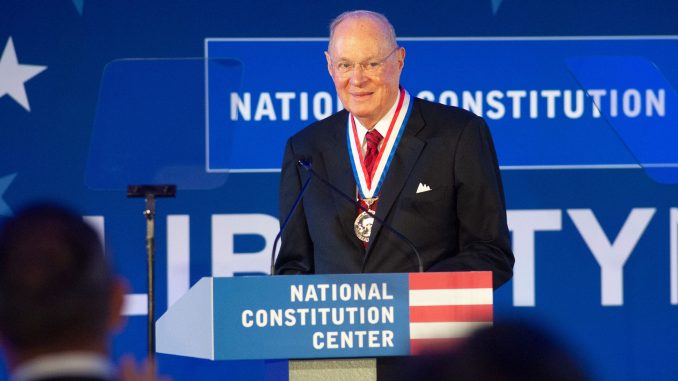
In March 2013, nearly a decade ago, in this space, I made a prediction.
“Within the next few months,” I wrote, “Justice Anthony Kennedy will likely rule that same-sex marriage is mandated by the Constitution of the United States … states will be forced to recognize same-sex marriages; same-sex marriage will enter the public-school lexicon; religious institutions will be forced to recognize same-sex marriages or lose their tax-exempt status. Religious Americans will be forced into violating their beliefs or facing legal consequences by the government.”
Welp.
This week, the Congress is poised to pass a bill that would sanctify same-sex marriage. That same bill essentially argues that opposing same-sex marriage is akin to opposing interracial marriage, an act of bigotry. It provides no explicit bar on removal of tax-exempt status from religious institutions. It does not protect religious individuals in their daily lives.
Meanwhile, the Supreme Court considers whether to force a religious web designer to make a website celebrating a same-sex marriage. Several of the more conservative justices seek to draw a line between anti-discrimination law—laws on the state and federal level preventing “discrimination” on the basis of “sexual orientation”—and religious freedom. They do so by creating distinctions on the basis of expressive behavior (say, artistic expression in making a website) versus simple services provision (say, running a restaurant); they do so by distinguishing between services that require a message (say, baking a wedding cake) and serving gay couples without any message attached.
All of this legal hairsplitting is being done in an attempt to craft a form of the so-called Utah Compromise. That compromise put in place an anti-discrimination law with specific religious exemptions. But the Utah Compromise creates two additional problems: first, it stigmatizes belief in traditional marriage as a sort of vestige of religious bigotry we allow out of an outdated sympathy for the antiquated Bible-believers; second, it does not extend the rights of religious people outside of religious institutions.
And, as it turns out, most religious people spend most of their time outside of religious institutions.
None of this would be necessary had we not undergone a complete transformation of the constitutional order over the past few decades. The Constitution of the United States provides zero power to the federal government to violate freedom of speech or association or religion. But, as Christopher Caldwell has pointed out in “The Age of Entitlement,” the Civil Rights Act created a “rival Constitution” dedicated to violating those freedoms in the name of anti-discrimination.
One can agree that racial bigotry is evil while still recognizing that the intrusion of the Civil Rights Act into private behavior—not merely in ending state-sponsored discrimination, which was necessary and appropriate—amounts to a massive expansion of federal power in violation of the Constitution.
The legal obliteration of the distinction between governmental and private activity was only one prong of the new societal remolding. The second was the philosophical obliteration of the distinction between immutable characteristics and behavior. The case can easily be made morally that people ought not be victims of discrimination based on their immutable characteristics, like race; rejecting moral disapproval of particular behavior, however, means destroying the basis for any moral system. Yet that is what the law does when it likens race to sexual orientation philosophically.
These twin attacks on traditional American society—vitiation of the distinction between private and public, and elimination of the distinction between innate characteristics and behavior—are predicates to tyranny. The new secular system sets up government as a new god, determining right and wrong and cramming it down on every subject.
You will be forced to celebrate the behaviors of others. You will be treated as a bigot if you do not. The Supreme Court may hold back the legal ramifications of the new tyranny for now, but anyone who relies on the court to do so forever will be sorely disappointed.
COPYRIGHT 2022 CREATORS.COM
The Daily Signal publishes a variety of perspectives. Nothing written here is to be construed as representing the views of The Heritage Foundation.
Have an opinion about this article? To sound off, please email letters@DailySignal.com and we’ll consider publishing your edited remarks in our regular “We Hear You” feature. Remember to include the url or headline of the article plus your name and town and/or state.

